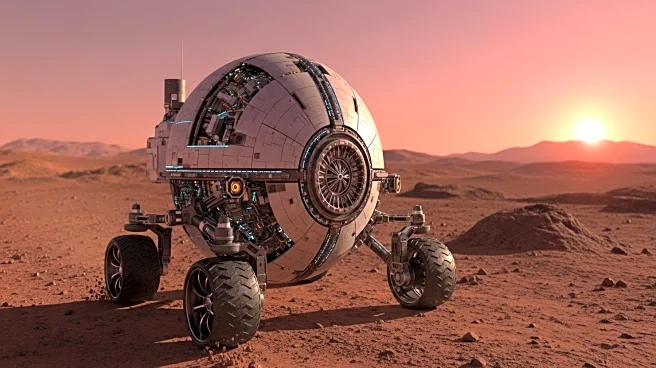What is the story about?
What's Happening?
The Tumbleweed Mars rover, a wind-driven spherical robot, has successfully passed crucial field tests, demonstrating its potential for large-scale exploration of the Martian surface. Developed by Team Tumbleweed with support from the European Space Agency, the rover is designed to roll across Mars, powered by the planet's winds. Recent tests at Aarhus University and in a Netherlands quarry confirmed the rover's ability to traverse Mars-like terrain. The Tumbleweed rover features solar-powered sails and can be deployed in swarms, offering a cost-effective alternative to traditional rovers. The project aims to deploy these rovers on Mars by 2034, providing a new method for exploring the planet's habitability.
Why It's Important?
The successful testing of the Tumbleweed rover represents a significant advancement in Martian exploration technology. By utilizing wind power, these rovers can cover large areas of the Martian surface, collecting valuable data on potential habitability and resources. This approach could reduce the costs and risks associated with traditional rover missions, enabling more extensive exploration of Mars. The Tumbleweed rover's ability to operate in swarms also allows for a more comprehensive study of the planet's environment, potentially identifying sites for future human missions or bases.
What's Next?
Following the successful tests, Team Tumbleweed plans to refine the rover's design and integrate additional scientific instruments. Further testing is scheduled in the Atacama Desert in November 2025 to simulate Martian conditions. The team aims to deploy up to 90 Tumbleweed rovers on Mars by 2034, marking a new era in planetary exploration. Continued development and testing will focus on ensuring the rovers' reliability and effectiveness in the harsh Martian environment.
Beyond the Headlines
The Tumbleweed rover concept highlights a shift towards more innovative and cost-effective exploration strategies. By leveraging natural forces like wind, these rovers could revolutionize how we study other planets. The project also underscores the importance of international collaboration and technological innovation in advancing space exploration. As the Tumbleweed rovers prepare for their mission, they represent a step forward in our quest to understand Mars and its potential for supporting life.















